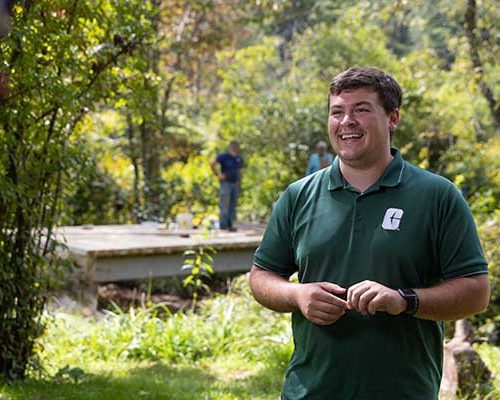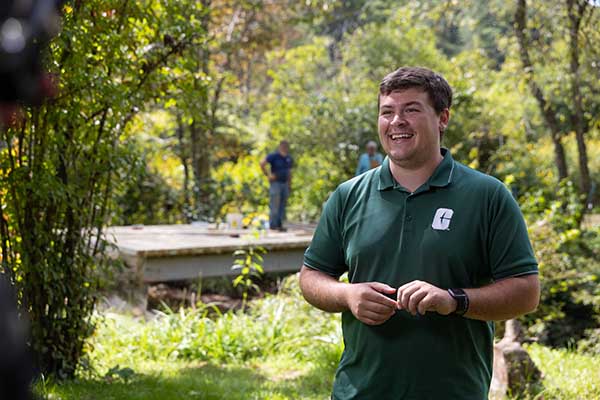Nathan Hall: Engineer with a future


When Nathan Hall graduates in December 2025, his career with the North Carolina Department of Transportation will begin immediately. He attributes this success to a great UNC Charlotte undergraduate experience. He took to heart the William States Lee College of Engineering’s focus on a real-world-ready curriculum; didn’t hesitate to tap the knowledge of his professors, whose expertise he recognized early on; took advantage of hands-on learning opportunities, knowing that’s how he learns best; and jumped into a four-year internship with NC DOT.
What he — or no one — could predict when he first arrived at Charlotte was the power of Hurricane Helene in September 2024 and the devastation it inflicted on western North Carolina near his Wilkes County hometown in the Blue Ridge Mountains.
“Helene hit close to home,” Hall said, explaining that his community had escaped the major damage of others nearby. “When a new course on bridge design was offered the following January — with the opportunity to do work that would directly help the residents of Lansing, just 30 minutes from home, I enrolled.”
As a resident of the area and a NC DOT intern, Hall — a self-described “bridge geek”— understood that hundreds of washed out bridges in Lansing and throughout Ashe County had been built across creeks, driveways and culverts on private property to help landowners navigate the geography to, from and around their homes. And that these bridges are not eligible for repair by state agencies.
Through their coursework, Hall and his classmates were introduced to consequential civil and environmental engineering by their professor, Shen-en Chen, who developed the course and managed its approval in record time to begin addressing the needs of Lansing residents and surrounding Ashe County.
“In a typical class, if I calculate a problem incorrectly, I might get a grade of B or C, and move on,” Hall explained. “In this course, a miscalculation could lead to a person and their car ending up in a creek. Every calculation mattered and we poured our hearts into it.”

Senior engineering student Nathan Hall, second from left, credits classmates from the bridge design course’s first cohort with the group’s overall success, in the classroom and in the field. He describes volunteers as “a blessing” to the bridge replacement projects throughout Ashe County.
Applying classroom to the field
When mountain highways became passable in the spring, the students were able to visit Ashe County bridge sites with Chen to apply what they were learning in the classroom to their assigned projects, including what they’d been able to discern and measure to that point only with drone footage. With requirements to design a bridge that could withstand a five-year flood — and the weight of an ambulance — for less than $50,000, the students were “thrown into the deep end,” managing real-world project components such as deadlines, budget and unexpected setbacks.
“I have to give my teammates a shout out,” said Hall. “Not only did we support one another through the technical challenges of the project, we grew together by stepping out of our comfort zones and stretching ourselves professionally. We improved our listening and communication skills by working together and talking to residents, and our presentation skills when explaining our work to others.”
Hall is quick to point out that every aspect of the bridge design experience is career transferable. Prior to being hired by NC DOT, he participated in job fairs sponsored by the Lee College of Engineering, which landed him several interviews. The hands-on nature of the engineering courses listed on his resume, the bridge design course included, impressed potential employers.
“They all asked, ‘Charlotte teaches this?’” he said. “One reason I chose Charlotte over other engineering programs is because it is growing. And UNC Charlotte is proving its intention to continue growing by its curriculum and the opportunities available for students.”
Hall sees how his decision to pursue a Charlotte engineering degree has led to where he is today — experienced, resilient and employable.
“Bottom line, my goal from the beginning — like that of every student — has been to be hired when I graduate. Every good thing that happens after that starts right there,” he said. “I decided to become a civil engineer because I want to help people. With the support of my professors, a great internship and being able to work on a project that is truly making a difference for people near my home, it’s clear that I can become the best engineer I can be.”
Written By Susan Messina
READ MORE ABOUT THIS PROJECT: Building Bridges: Niner engineers support a community’s recovery